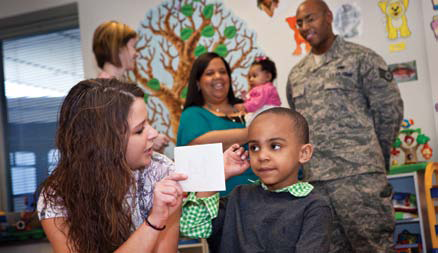ABA Tele-Medicine Project at the UNMC Munroe-Meyer Institute (NE UCEDD)
May 23, 2011

|
| Rashea Fuchtmam conducts an Applied Behavior Analysis therapy session with Dell Parks while his parents, Stephanie and Wendel Parks, talk with ABA therapist Amber Paden. |
Wayne Fisher, Ph.D., director of the Center for Autism Spectrum Disorders at the UNMC Munroe-Meyer Institute (Nebraska UCEDD) has a plan to train 40 service providers to treat ASD using the web, which means anyone near a military base anywhere in the world is eligible.
Thanks to a recently approved $1.5 million grant from the United States Army, Dr. Fisher and his team will recruit participants to educate via telemedicine as well as on site at MMI. The curriculum will include 40 hours of coursework, including web-based video observations of ABA therapy sessions conducted at MMI; Recorded role-play sessions with other trainees; and corrective feedback on role-play performance by UNMC experts.
Dr. Fisher predicts even those with no formal training will conduct therapy sessions with 90 percent accuracy and master ABA concepts. Completion of the training would make them eligible for certification as an ABA tutor with Tricare, the health care program for active duty military.
"This project will directly impact the care available to military children with autism by increasing access to services," he said. "And hopefully, it will lessen the overall stress on these families as they continue to serve our country."
While the grant project from the Department of Defense is designed to test the effectiveness of telemedicine training, 20 children with autism from military families, including children of personnel stationed at Offutt Air Force base in Omaha, will benefit from ABA treatment. According to Dr. Fisher, such therapy lowers the average lifetime cost of caring for an individual with autism by $1.6 million.
In addition, Dr. Fisher believes those who are treated via telemedicine will progress just as much as children who receive traditional, in-person treatment. "We'll see a reduction in autistic symptoms and behaviors and improvements in communication and social skills," he said.







